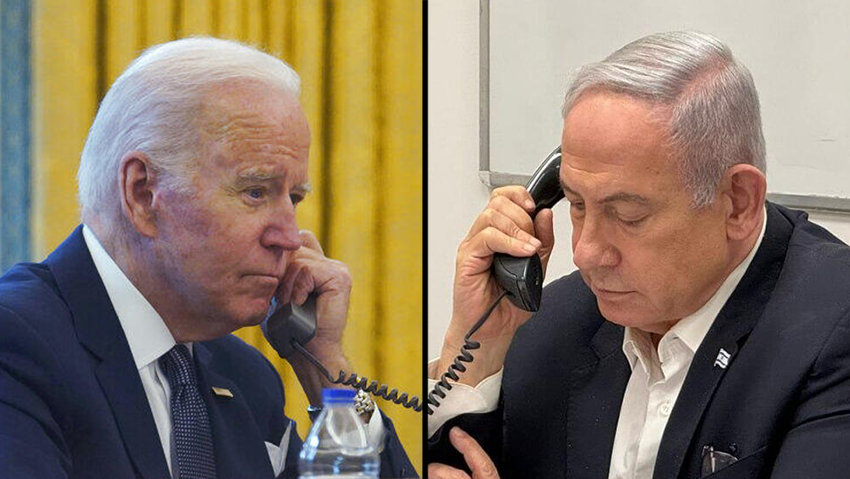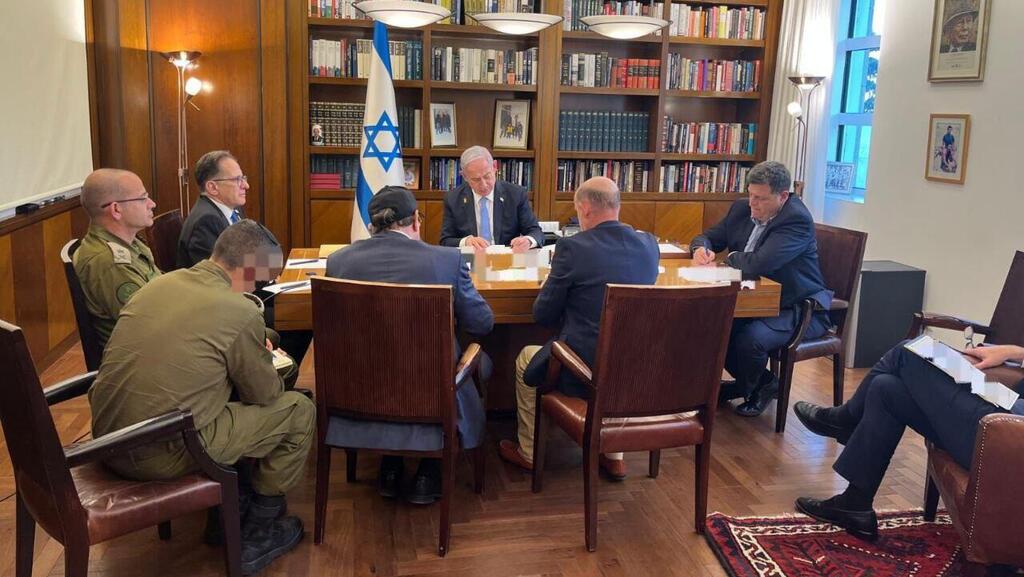Getting your Trinity Audio player ready...
U.S. President Joe Biden spoke Wednesday with Prime Minister Benjamin Netanyahu for 50 minutes, a day after the prime minister's decision to postpone Defense Minister Yoav Galant's scheduled visit to Washington until he had a conversation with Biden. Democratic presidential candidate and Vice President Kamala Harris also joined the conversation, according to the White House.
According to officials in Jerusalem cited by Reuters, the conversation between the two leaders was intended, among other things, to discuss Israel's plans for a retaliatory attack against Iran, in response to the latest barrage it launched into Israel. Also present in Netanyahu's office during the conversation were the Minister of Strategic Affairs Ron Dermer; the prime minister's political advisor Ophir Falk; National Security Council Deputy Director Gil Reich, Head of the National Security Council Foreign Policy Division, Dr. Joseph Drazanin; and prime minister's military secretary, Maj. Roman Goffman.
2 View gallery


President Joe Biden and Prime MInister Benjamin Netanyahu talk for the first time in 6 weeks
(Photos: Prime MInister's Office; SP Photo)
Shortly after the conversation, Defense Minister Yoav Gallant - who visited Unit 9900 of the Intelligence Division, which is used to collect visual intelligence - said that "the Iranian attack was aggressive but inaccurate. Whoever attacks us will be hurt and will pay a price. Our attack will be deadly, precise and above all surprising, they will not understand what happened and how it happened, they will see the results."
Gallant received a briefing from unit 9900 on the preparation for the latest attacks in Lebanon, and also for attacks that are expected in other arenas. "Thanks to you, we see the entire Middle East - Iran, Lebanon, Syria, Yemen, Iraq and everywhere else," he said. "We see exactly and in a very, very focused way any place we want."
Gallant's flight to the U.S., now postponed until after a potential discussion between Biden and Netanyahu on Wednesday, was aimed at enhancing coordination between Jerusalem and Washington as the IDF prepares to respond to Iran's second ballistic missile attack within a year.
Gallant, as noted, delayed his planned night flight partly because the government had not yet approved his trip. It is believed Netanyahu is actually wary of Gallant gaining more clout in the eyes of Biden and wants to demonstrate to his Likud base that he is preventing Gallant from coordinating with the U.S.
The Americans were utterly shocked on Tuesday, as this has gone from being a conflict between Netanyahu and Gallant to one also between Netanyahu and the Biden administration. The Defense Minister was invited by the Americans, who see him as "the war liaison," and he coordinated his trip with the Prime Minister's office. Until Tuesday night, despite lacking travel approval, Gallant's associates were confident the trip would proceed as planned.
Meanwhile, even before Netanyahu and Biden's conversation, the Prime Minister spoke with former U.S.; President Donald Trump, who is the Republican Party's current candidate for presidential elections next month. Netanyahu's office reported that Trump called the prime minister on his own initiative about a week ago, and congratulated him on the determined and powerful actions Israel took against Hezbollah. U.S. Senator Lindsey Graham also participated in the conversation.
An Israeli official told The Washington Post that Netanyahu had tried several times to reach Biden by phone but was unsuccessful. An American official denied these claims, calling them untrue.
"The administration consults with Israelis on a number of levels and we've always said the leaders will speak soon, following these consultations. That is what we agreed in recent weeks," he said, adding that a call on Tuesday was not possible because Biden was traveling to Wisconsin and Pennsylvania to address the hurricane response.
According to The Wall Street Journal, Israel has refused to provide the Biden administration with details of its planned attack on Iran after Iran launched its missile strike on Israel earlier this month.
Hours after news broke of Netanyahu delaying Gallant’s visit, U.S. officials told the Journal there was growing frustration in the administration over being repeatedly surprised by Israeli military operations in Lebanon and Gaza.
Sources detailed a conversation between Gallant and his U.S. counterpart, Defense Secretary Lloyd Austin, shortly after the assassination of Hezbollah leader Hassan Nasrallah in a bombing of his bunker in Beirut last month. "Sorry, what did you say?" Austin reportedly asked, according to officials with knowledge of the exchange. Austin also questioned whether Israel intended to defend itself on its own, given the lack of communication with the administration.
Sources said Austin was frustrated because the U.S. had insufficient time to organize its forces to assist Israel or protect American troops in the Middle East. Washington officials expressed hope that in the future, they would have more advance notice of attacks that could lead to greater American involvement, as Israel continues to vow retaliation against Iran.
American officials believe Israel will target Iranian military and intelligence assets. A conversation between Biden and Netanyahu, details of which were revealed on Tuesday in excerpts from a new book by journalist Bob Woodward, reportedly led to a tempered Israeli response to an Iranian attack in April. Biden is said to have told Netanyahu to "take the win" after the Iranian attack failed, advising that no further action was necessary.
Israel may be withholding information from the administration due to concerns over leaks. Shortly before the Israeli ground offensive in southern Lebanon began last week, U.S. officials leaked details of the IDF's operational plans to the media, likely in an effort to prevent any miscalculations by Iran, which has since launched over 180 ballistic missiles at Israel.
Meanwhile, on Tuesday conversations between Prime Minister Benjamin Netanyahu and U.S. President Joe Biden were publicly revealed that resulted in Israel's moderate reaction in Iran. Biden asked Netanyahu to "take the victory" of the failure of the Iranian attack, telling him, according to a book by journalist Bob Woodward: "You should not take on step further. Don't do anything."
Netanyahu meets a delegation of US senators led by Lindsey Graham
(Video: GPO)
In the end, as mentioned, Israel reacted in a targeted and limited manner to Iran, when according to reports outside of Israel, it attacked the radar of an advanced air defense battery that protects the reactor in Natanz .
It was revealed by Ynet on Tuesday night that this wasn't the first such incident between the two. Prior to the incident barring Gallant from traveling to the U.S. and imposing conditions, which included "decisions on Israel's next actions," the prime minister previously demanded amid wartime to talk with a leader of a nation maintaining diplomatic relations with Israel, to which Gallant had discreetly traveled. The conversation occurred, and negotiations with Netanyahu allowed the flight to proceed.






